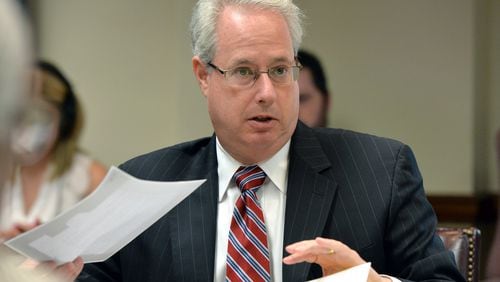WASHINGTON -- Georgia Attorney General Sam Olens, joined by eight other states, filed a federal lawsuit against the Obama administration's new clean water rule today -- leading a charge that could wind up in the U.S. Supreme Court.
Filed in federal court in the Southern District of Georgia, the suit challenges a new regulation by the Environmental Protection Agency and U.S. Army Corps of Engineers that would allow the government to regulate tributaries to rivers and streams under the Clean Water Act.
From our story last month about the final rule:
The EPA and the corps first proposed the rule more than a year ago to protect tributaries to navigable waterways, which are protected under the Clean Water Act. A severe backlash followed from developers and farmers, who claimed, for example, that it would require them to get federal permits when fertilizing near their drainage ditches. The EPA said Wednesday that the final rule applies only to "ditches that are constructed out of streams or function like streams and can carry pollution downstream." ...
A lawsuit is all but certain. In addition, congressional Republicans have gone on sustained attack. The House passed a bill this month to block the rule, with all of Georgia's Republicans and two of the state's four Democrats — U.S. Reps. David Scott of Atlanta and Sanford Bishop of Albany — in favor. Scott serves on the Agriculture Committee and Bishop has a heavily rural district.
The group of attorneys general is all Republican, except Kentucky Democrat Jack Conway, who is running for governor of the conservative-leaning state. The move comes one day after the Supreme Court ruled against EPA on a clean air rule, saying the agency did not properly take industry costs into account.
Georgia's suit claims the water rule is "an attempt by two agencies of the federal government to usurp the States’ primary responsibility for the management, protection, and care of intrastate waters and lands."
The Clean Water Act allows the government to limit pollution in "navigable" waterways. The Obama administration says because tributaries feed into these waterways, they, too, should be protected from pollution. The rule also maintains long-standing farming exceptions.
Environment Georgia Director Jennette Gayer said her organization is likely to file a brief opposing Olens' suit:
"Clean water is critical to our livelihoods and the vitality of Georgia's communities.EPA's Clean Water Rule helps to make sure Georgians have access to the clean water they need for drinking, commerce and recreation. Since the rule restores protections to streams and other waterways that have historically been protected by the Clean Water Act it is hard to understand the Attorney General's prediction of 'dire consequences.'"
Georgia's lawsuit quotes more than once from swing Supreme Court Justice Anthony Kennedy in the 2006 case of Rapanos vs. United States:
Under Justice Kennedy's interpretation, the Agencies would not be permitted to assert jurisdiction over all "wetlands (however remote)" or "a continuously flowing stream (however small)."
Here is the full complaint for your perusal:







